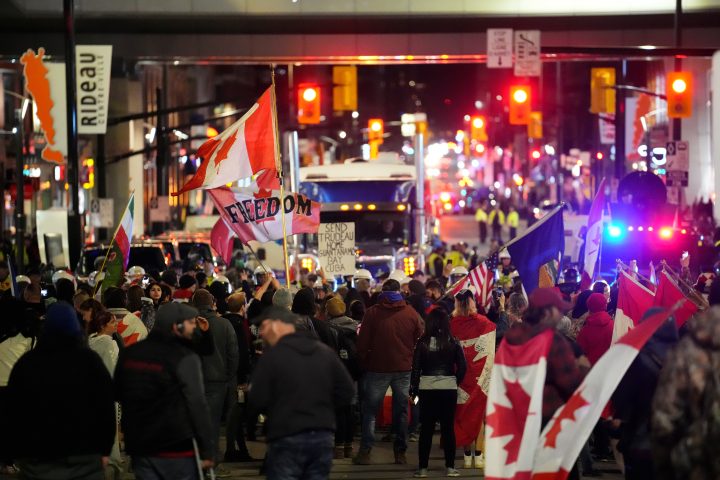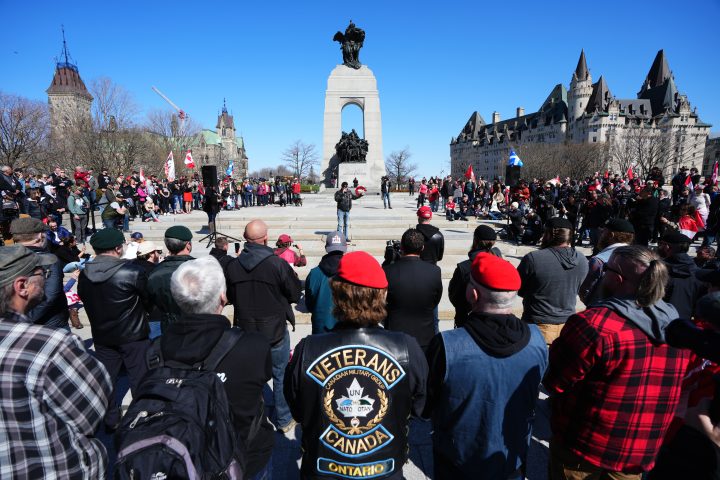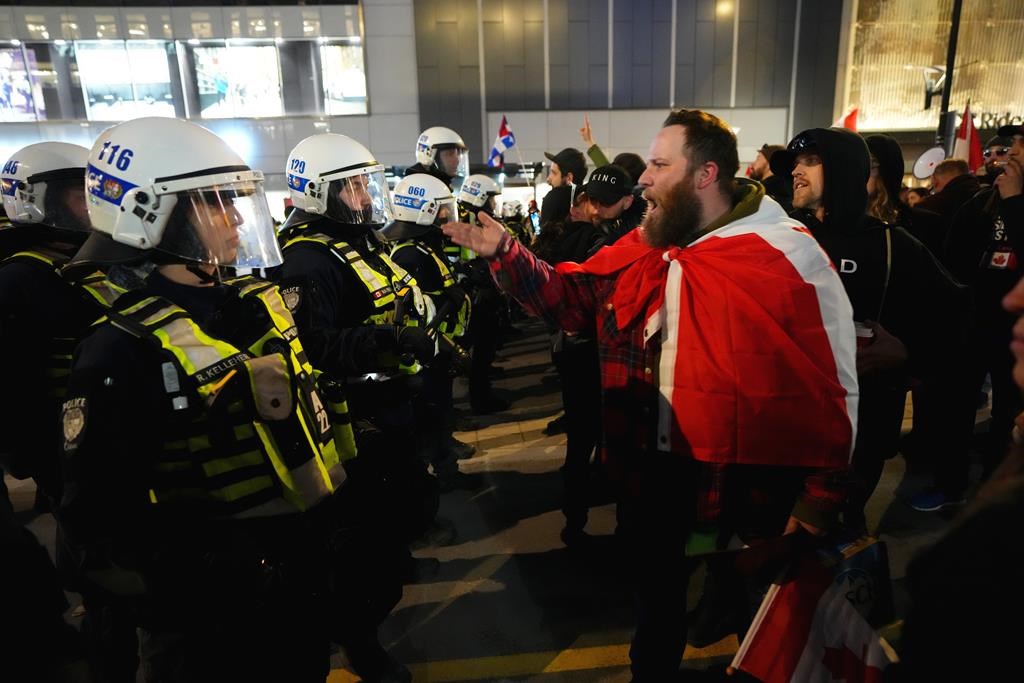Former “Freedom Convoy” protesters returned to Canada‘s capital by the hundreds on Saturday to revel on Parliament Hill and denounce COVID-19 mandates as police staged a massive operation to keep the peace and make sure demonstrators actually return home.

Protesters embraced each other, many having not seen one another since police cleared the convoy encampments that ground Ottawa to a standstill for three weeks in February.
Crowds of people danced on the street in front of parliament shouting “freedom!” while others stretched out on the lawn in front of Centre Block.
Freedom Fighters Canada spokesperson Bethan Nodwell, who helped organize the “Rolling Thunder” rally on Parliament Hill Saturday, said no other activities were planned aside from a Sunday church service.

But Centretown Community Association President Mary Huang said residents in the area are still waiting to see if the protests wind down as anticipated and don’t drag on as they did before.
“Especially some seniors in Centretown, they were basically held hostage in their homes for two, three and a half weeks. So they’re a little bit still traumatized,” Huang said.
“The real test is if (the protesters are) going to leave like they say they will, or if they’ll attempt something else.”
Ottawa Mayor Jim Watson said police took “a strong stance” to prevent the kind of prolonged demonstration that gripped Ottawa over the winter.

Get daily National news
“Obviously what happened in February caused a lot of harm to a lot of people,” Watson said.
Ottawa police called in more than 800 reinforcements from RCMP and other police services who blocked off highway exits and every street into the core to prevent a new encampment from forming.
Still, that doesn’t mean Ottawa has seen the end of the convoy protesters.
“We never left,” Nodwell said. Small groups of five to 10 protesters have been visiting the grounds of parliament since February to continue to call for an end to COVID-19 restrictions, she said.
Police made a handful of arrests on Saturday, including a driver who allegedly tried to jump onto a sidewalk to get around officers. Police arrested the person for dangerous driving and found them in breach of their bail conditions related to the previous protest, when they were ordered not to return to Ottawa.
Saturday’s events were relatively peaceful compared to an altercation between police and protesters on Friday evening, when officers arrested seven people and faced off with what they described as an “aggressive crowd” just outside the parliamentary precinct.
The protesters kicked off Saturday’s events by vowing to reclaim the National War Memorial with a morning ceremony at the cenotaph.
Speakers recounted the way police removed protesters from the area after their three-week demonstration on Parliament Hill, as hundreds of supporters gathered around the monument to listen.
Hundreds of supporters watched retired Afghanistan veteran Christopher Deering lay a wreath on the Tomb of the Unknown Soldier in a quasi-remembrance ceremony.
Deering said he was detained by police as part of their effort to remove “Freedom Convoy” protesters from the core in February.
“Afterwards, myself and the other peaceful citizens were thrown out of the city like garbage and told not to return to our nation’s capital,” Deering told the crowd Saturday.
The group also took issue with police erecting a fence around the monument in February after a woman desecrated the Tomb of the Unknown Soldier by standing on it during the protest. Demonstrators who identified themselves as veterans later dismantled the fence and took it upon themselves to guard the tomb.
Speakers at Saturday’s event also expressed their opposition to vaccine mandates, COVID-19 restrictions and Prime Minister Justin Trudeau’s government, though supporters were asked to remove slogans with expletives aimed at the prime minister.
At the ceremony, the majority raised their hands when a speaker asked who was at the convoy protest in February.
Officials described downtown Ottawa as falling into a state of lawlessness during those demonstrations, and the federal government invoked the Emergencies Act in an effort to dislodge participants and similar protesters who blockaded border crossings across the country.
Eventually, with the help of hundreds of police officers from other parts of the country, Ottawa police removed them from the capital’s streets.
Shortly before the ceremony Saturday, a small group of counter-protesters gathered across the street from the memorial chanting “go home” to express that the protesters were not welcome back in the city.
“The Tomb of the Unknown Soldier is not an appropriate place to express partisan political views, it’s just wrong. It’s not what we stand for,” counter-protestor Chris Anderson said in an interview.
Anderson said he was a veteran himself, having served seven years as a medical worker.
“In some ways, to me, they’re poisoning the monument,” said Anderson, who wore a t-shirt with a rainbow in support of some of the city residents who felt unsafe due to the demonstrations.
After the ceremony, the crowd moved south to Elgin Street to watch a parade of motorcycles pass by while police kept people away from the road.
- Indian government no longer targeting Canadians, senior official says on eve of PM’s visit
- Best friends who played on Jasper hockey team remembered as ‘bright shining lights’
- Cervical cancer is ‘fastest-rising’ form in Canada as doctors urge action
- Canada’s military recruitment surged amid sovereignty threats: data
The motorcycles had initially planned to drive past Parliament Hill and park near the war monument, but police banned vehicles from the area.
The afternoon rally on Parliament Hill included controversial speaker Chris Sky, whose real name is Chris Saccoccia.
Sky, a figure in the anti-mask movement, has been noted making anti-Semitic, Islamophobic and racist comments, according to the Canadian Anti-Hate Network.
– With files from Sarah Smellie in St. John’s









Comments
Want to discuss? Please read our Commenting Policy first.